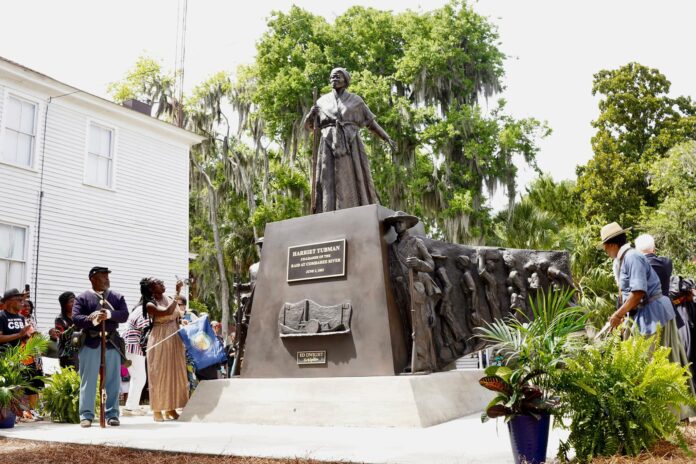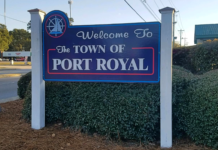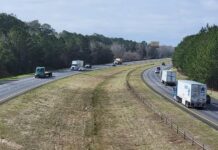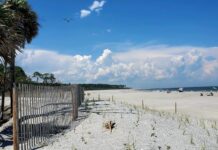After nearly seven years of fundraising efforts to create a permanent monument to Harriet Tubman, the beautiful 14 foot tall, hand-sculpted piece of art was unveiled on Saturday afternoon during a moving ceremony at the historic Tabernacle Baptist Church in downtown Beaufort, SC that was attended by about 700 people; including Ernestine Wyatt, 3x great grandniece of Tubman herself.
Sculptor Ed Dwight, who is known for completing more than 100 history-rich memorials and art projects dedicated to the African experience, has created a 14 foot tall larger than life-sized sculpture of Tubman on top of a bronze pedestal that features scenes depicting slaves rushing toward their escape and refuge in 1863. The sculpture features an image of a typical soldier under arms and provides an area for imagery or interpretative text to share more about the legendary Combahee River raid and Tubman’s involvement in Beaufort.
The monument depicting Harriet Tubman’s heroic ventures now sits next to the 161 year old church on Craven Street in downtown Beaufort, SC. Tabernacle Baptist is also the burial place of Robert Smalls, who was born a slave in Beaufort and became a Civil War hero and Congressman. A bust of Smalls is also on the church grounds.
But her work in South Carolina during the Civil War often gets overlooked, said the Rev. Kenneth Hodges, the church’s pastor for 29 years. The monument is the very first in the state marking her daring mission in June 1863 along the Combahee River.
“We wanted to do something more meaningful to put an emphasis on the role she played specifically in Beaufort County. We felt that the time was right now. Although she helped with the raid that was led from Beaufort, Tubman also served as a scout, a spy, cook and did things to help newly freed slaves, mainly women, become self-sufficient,” Tabernacle Baptist Church Pastor and former S.C. Rep. Kenneth Hodges said.
Craven Street is steep in history. The old Beaufort Arsenal and the Beaufort history Museum is a block east of the church. To the west is the Secession House, site of many informal discussions and formal meetings during the 1850’s to discuss withdrawal from the Union. Many historic homes also line the street, and it’s all right in the middle of the Reconstruction Era National Historical Park.
For more information about the Harriet Tubman Monument in Beaufort, you can visit https://www.harriettubmanmonument.com/










